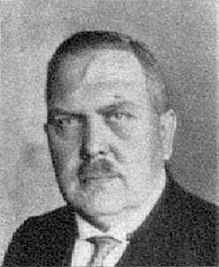Wilhelm Laverrenz
Wilhelm Laverrenz (born March 24, 1879 in Berlin ; † June 13, 1955 there ) was a German politician. In 1918 he helped found the DNVP and became a member of the CDU after the Second World War .
Life and work
Wilhelm Laverrenz was the son of Karl Laverrenz, chamber musician at the Berlin State Opera, and Louise Laverrenz, nee Wilde. In September 1918 he married Grete Oberfeld, the daughter of a senior magistrate from Stutthof near Danzig. The couple had a son (* 1921) and lived in Berlin-Friedenau at the end of the 1920s .
After graduating from the Friedrichswerder high school in Berlin, Laverrenz, who was of Protestant faith, studied mechanical engineering at the Technical University of Charlottenburg from 1898 to 1903 . During his studies he became a member of the Thuringia Berlin fraternity in 1898 . After military service with the Railway Regiment No. 1, he worked from 1904 as a government construction manager (from 1909 as a government master builder) at the Prussian state railway administration. In 1910 he moved to the Imperial Colonial Administration and became head of the railway administration in the Togo protected area and chairman of the Lomé Railway Office . At the outbreak of the First World War , he was taken prisoner by the French there (until 1916). After the First World War, he was promoted to government building officer in Berlin-Halensee and in 1921 to senior government building officer. From 1927 he was director at the Central Railway Office of the Reichsbahnverwaltung . In 1933 he moved to the Prussian Ministry of Economics and Labor as a ministerial director .
At the beginning of the National Socialist era , Laverrenz helped found the Berlin resistance group “Stille Front”. In 1934 he was dismissed from civil service on the basis of the “ Law for the Restoration of the Professional Civil Service ” and, after nine months of pre-trial detention, sentenced to six months in prison by the Berlin II Special Court for “preparation for high treason”. In the following years he stayed in Vienna , where he was arrested on February 14, 1938, before the " Anschluss of Austria ".
After the Second World War , Laverrenz was a member of the federal management of the State of Berlin in the German Association of Officials (DBB) until 1951 .
Political party
Laverrenz was a co-founder of the Berlin DNVP and in the 1920s chairman of the regional association of the German Nationalists and the Bismarck Youth . In addition, he acted as the editor of the party organ National Post . In 1945 he was one of the founding members of the CDU Berlin .
MP
Laverrenz was a member of the Weimar National Assembly in 1919/20 and was then a member of the Reichstag until the November 1933 elections . In both parliaments he represented constituency 3 (Berlin). From 1950 to 1953 he was a member of the Berlin House of Representatives , of which he was age president .
literature
- Werner Breunig, Siegfried Heimann , Andreas Herbst : Biographical Handbook of Berlin City Councilors and Members of Parliament 1946–1963 (= series of publications by the Berlin State Archives . Volume 14 ). Landesarchiv Berlin , Berlin 2011, ISBN 978-3-9803303-4-3 , p. 163 (331 pages).
- Martin Schumacher (Hrsg.): MdR The Reichstag members of the Weimar Republic in the time of National Socialism. Political persecution, emigration and expatriation, 1933–1945. A biographical documentation . 3rd, considerably expanded and revised edition. Droste, Düsseldorf 1994, ISBN 3-7700-5183-1 , p. 278 .
- Helge Dvorak: Biographical Lexicon of the German Burschenschaft. Volume I: Politicians. Volume 3: I-L. Winter, Heidelberg 1999, ISBN 3-8253-0865-0 , pp. 254-255.
Web links
- Wilhelm Laverrenz in the database of members of the Reichstag
- Wilhelm Laverrenz in the Munzinger archive ( beginning of article freely accessible)
- Biography of Wilhelm Laverrenz . In: Heinrich Best and Wilhelm H. Schröder : Database of Members of the National Assembly and the German Reichstag 1919–1933 (Biorab – Weimar)
Individual evidence
- ↑ Herrmann AL Degener (Ed.): Who is it? - Our contemporaries. IX. Output. Verlag Herrmann Degener, Leipzig 1928, p. 917.
| personal data | |
|---|---|
| SURNAME | Laverrenz, Wilhelm |
| BRIEF DESCRIPTION | German politician (DNVP, CDU), MdR, MdA |
| DATE OF BIRTH | March 24, 1879 |
| PLACE OF BIRTH | Berlin |
| DATE OF DEATH | June 13, 1955 |
| Place of death | Berlin |

